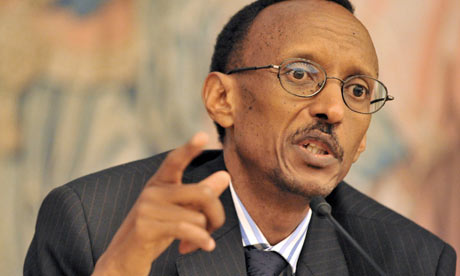 |
| "Paul Kagame has faced charges that his regime is increasingly authoritarian after the opposition was effectively barred from challenging him in August's presidential election." (Uwe Anspach/EPA) |
By Chris McGreal
The Guardian, December 31, 2010
"Tony Blair has defended his close personal and working relationship with one of Africa's most controversial leaders, Rwanda's Paul Kagame, even as foreign governments distance themselves over accusations of war crimes and the suppression of political opposition. Blair has described Rwanda's president as a 'visionary leader' and a friend after making the central African country the focus of the work of his charity, the Africa Governance Initiative (AGI), to turn around the continent's fortunes. ... But the relationship has come under increasing scrutiny following a UN report that accused Kagame's forces of war crimes, including possibly genocide, in the east of Democratic Republic of Congo, and charges that the Rwandan government is increasingly authoritarian after the opposition was effectively barred from challenging Kagame in August's presidential election. The White House has criticised Kagame for the suppression of political activity and made clear that it does not regard Rwanda as democratic. But Blair said allowances have to be made for the consequences of the 1994 genocide of hundreds of thousands of Tutsis and suggested that Kagame's economic record outweighed other concerns. ...
The publication of a UN report in October accusing Rwanda of war crimes in eastern Congo, including the wholesale massacres of Hutu civilians and the plunder of minerals, tarnished Kagame's image. He has vigorously denied the accusations but human rights groups have been documenting such crimes for years. Blair rolled his eyes at mention of the UN report, which he questions, and suggested that Rwanda's occupation of eastern Congo for many years was justified by the continuing threat from Hutu extremists. 'He (Kagame) and I specifically discussed this,' Blair said. 'They [the Rwandan government] very strongly push back against the allegations that are made. You've got to understand that it's a very difficult situation in Congo because you've got the rival forces fighting each other and that's spilling across into his territory.' Kagame has also been forced on the defensive over his re-election in August, with 93% of the vote, after his main rivals were jailed and barred from running after being accused of stirring up ethnic hatred between Hutus and Tutsis after what Human Rights Watch called 'persistent harassment and intimidation' of their parties by the government, and the curbing of criticism in the press including the banning of two newspapers. The deputy leader of a third opposition party was murdered in July. There is a growing perception among human rights groups that Kagame has used accusations of 'divisionism' and 'genocide ideology' to suppress legitimate political criticism. But Blair said the Rwandan government's sensitivity is justified because of the country's recent history. [...]"














No comments:
Post a Comment
Please be constructive in your comments. - AJ